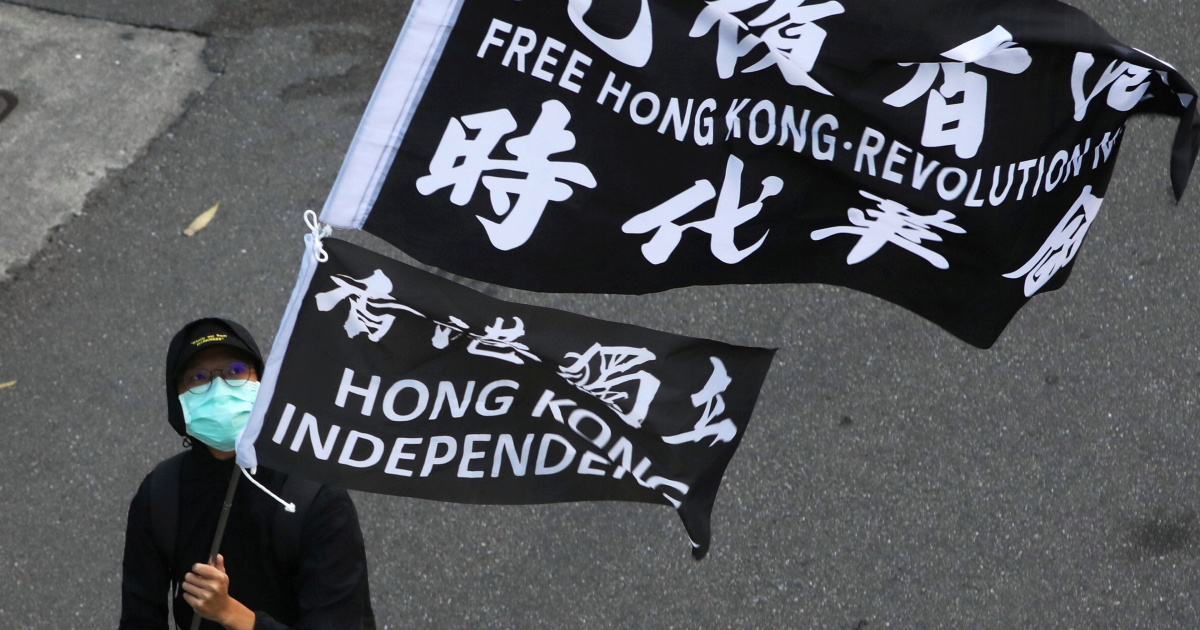Bill to help Hong Kong protesters stay in US as refugees revived
Hong Kong Safe Harbor Act aims to help residents of the Chinese-controlled city gain refugee status in the United States.
A bipartisan group of legislators in Washington, DC, have reintroduced a bill to make it easier for Hong Kongers fearing persecution in the Chinese-controlled city to secure refugee status in the United States.
The 12 senators, led by Republican Marco Rubio and Democrat Bob Menendez, said on Tuesday that the bill was a response to the national security law that China’s parliament imposed on Hong Kong, punishing anything Beijing deems secession, subversion, terrorism or collusion with up to life in jail.
The security legislation was enacted in June last year, following months of sometimes violent pro-democracy protests in the semi-autonomous city.
Since then, more than 100 people have been arrested over security offences, while dozens of prominent activists and politicians have fled the city, seeking asylum in countries and territories including Taiwan, Germany and the United Kingdom.
In a joint statement, the US senators said the proposed Hong Kong Safe Harbor Act would “ensure those Hong Kongers who peacefully protested Beijing’s corrupt justice system, and have a well-founded fear of persecution” were eligible for processing as refugees in Hong Kong or a third country.
Asylum seekers from Hong Kong would not be subject to a numerical limitation, they added.
‘Lifeboat for Hongkongers’
The proposed law would also make it easier for dissidents to seek asylum by waiving provisions that make suspected intent to immigrate or a criminal record disqualifying factors for non-immigrant visas.
Additionally, it would make Hong Kongers who have their residency revoked eligible for refugee status as victims of political persecution.
“The US must do all it can to assist those Hong Kongers who have courageously stood up to defend the city they love from the CCP’s persecution and open our doors to them,” Rubio said, referring to the Chinese Communist Party.
Menendez said the aim was “to reiterate to the Chinese Communist Party that the United States stands foursquare with the people of Hong Kong” and to show they would not “fall through the cracks of our broken immigration system”.
The bill was reintroduced because a previous version expired when a new Senate was seated last month.
Hong Kong Watch, a UK-based campaign group, welcomed the move in a Twitter post.
“We hope the USA will soon join the UK, Canada and Australia in offering a lifeboat for Hong Kongers in need of a lifeline out of the city,” the group said.
Hong Kong was formerly a British colony and the UK introduced a new visa scheme last month that will allow certain Hong Kong residents to apply for British citizenship after five years in the country. London predicts as many as 322,000 people and their families could take up the offer over five years.
A Hong Kong government spokesman said concerns about the erosion of freedoms were “totally unsubstantiated” and that the security law had stopped chaos.
“People’s decisions to remain in or leave Hong Kong, or anywhere for that matter, are based on many factors including job situation, schooling, business and investment opportunities or personal/family reasons,” he told Reuters news agency.
Migration to Canada
Australia and Canada also announced special immigration measures for Hong Kong residents last year.
Canadian cities such as Vancouver and Toronto, in particular, have become a magnet for Hong Kong residents seeking to escape China’s tightening grip, according to a report by Reuters.
Some 300,000 Hong Kongers already have Canadian citizenship, from when many families moved there ahead of the city’s return from British to Chinese rule in 1997.
“Staying in Hong Kong is not an option any more,” said Maria Law, a 39-year-old flight attendant, who moved to Vancouver last year with her two daughters ahead of her husband.
“I’d rather have a free future for my daughters instead of making money while they have to keep their mouths shut.”
It is hard to track exactly how many Hong Kongers are moving to Canada as many can travel freely between the two places, and Canada’s immigration authorities say new visa applications from the city rose more than 20 percent to 10,819 in 2020.













